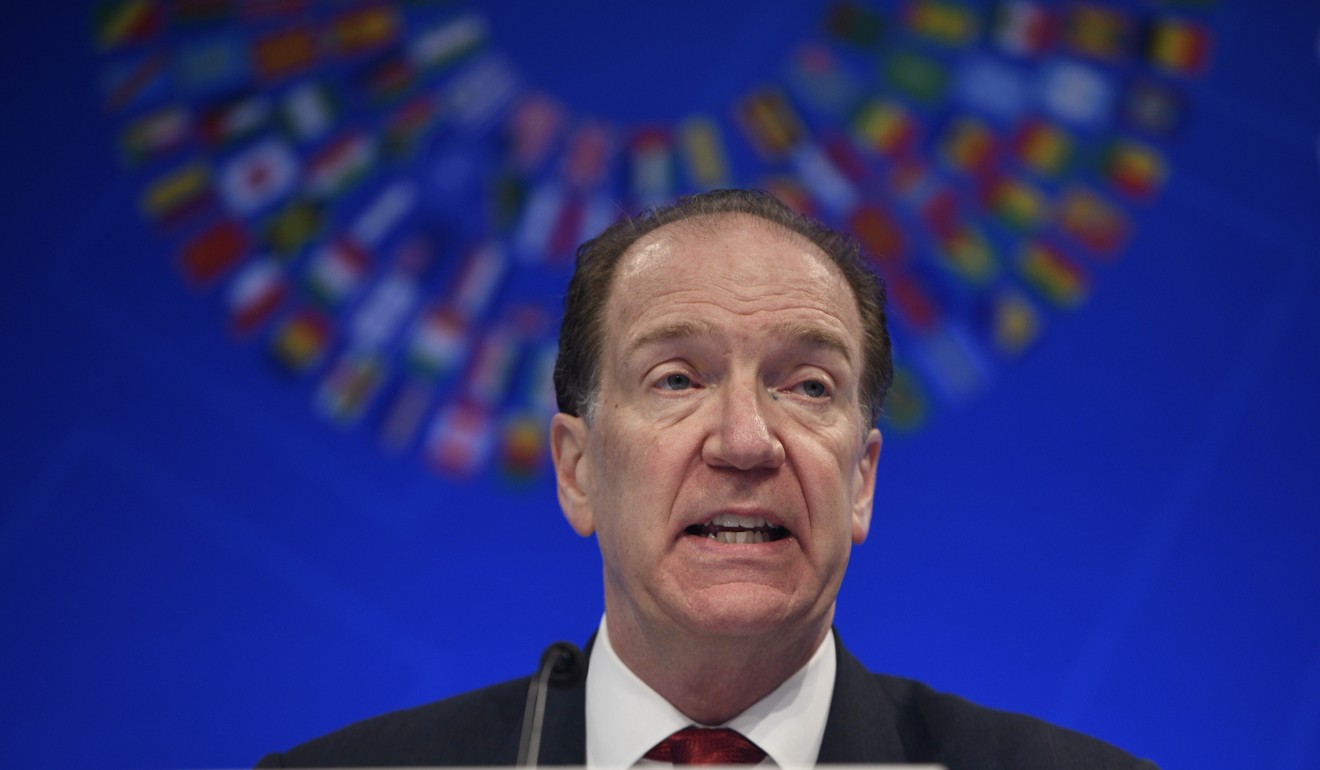
Donald Trump’s trade wars sent global investment tumbling, World Bank says
- World Bank joins the IMF in lowering its forecast over concerns US president’s trade actions will undermine global growth
- The Trump administration and Beijing have imposed tariffs on hundreds of billions of dollars of each other’s imports
The World Bank on Tuesday revised growth forecasts downward for the world for this year as a tit-for-tat tariff war between the United States and China sent global investment tumbling.
The Washington-based lender to developing world countries said in its half-yearly global health check that spiralling political uncertainty was to blame for a slowdown in trade and a collapse in investment spending that will push down GDP growth to 2.6 per cent this year “before inching up to 2.7 per cent in 2020”.
The decision by the Trump administration to impose higher tariffs on Chinese imports and prolonged Brexit uncertainty were among a string of events to increase the World Bank’s policy uncertainty index to a record high.
“Heightened policy uncertainty, including a recent re-escalation of trade tensions between major economies, has been accompanied by a deceleration in global investment and a decline in confidence,” according to the report.
The report’s gloomy findings were echoed in a speech on Tuesday by the US Federal Reserve chair, Jerome Powell, who pledged to take “appropriate” measures to protect the US economy from the impact of trade wars.
IMF cuts forecast for global economic growth in 2019 amid trade tensions
In what was widely seen as a hint that the Fed could cut interest rates in the coming months if the US economy cools, Powell told a monetary policy conference in Chicago that the central bank was “closely monitoring the implications” of ongoing trade disputes.
He said: “We don’t know how or when these issues will be resolved. As always, we will act as appropriate to sustain the expansion.”
Behind the global concerns and market jitters are US President Donald Trump’s trade war with China and threats to expand it to include allies such as Mexico and the European Union. Morgan Stanley is warning that an escalation of the conflict between Beijing or Washington alone could tip the world into recession within nine months.
The World Bank said emerging economies in Asia, South America and Africa were constrained by sluggish investment “and risks are tilted to the downside”.
Was this the moment US-China trade talks fell apart?
Newly-installed World Bank President David Malpass, who in his previous position with the US Treasury participated in Trump’s stalled trade negotiations with China, said global growth is “fragile” and the slowdown jeopardises progress in battling world poverty.
“The global economic outlook, in both the near and long term, is confronting substantial challenges,” he told reporters.

The new forecast was decidedly gloomier than the latest outlook by the International Monetary Fund (IMF), released in April, but which likewise predicted a slowdown and warned of the risks posed by trade conflicts.
In East Asia and the Pacific, total economic output is likely to drop below 6 per cent for the first time since the Asian financial crisis more than 20 years ago.
China’s forecast is little changed, with growth projected to slow to 6.2 to per cent this year.
The forecast for the United States is unchanged, with GDP growth slowing to 2.5 per cent this year before weakening to 1.7 per cent in 2020, though still considerably stronger than other advanced economies.
Vietnam biggest winner from first year of the US-China trade war as supply chains shift, report shows
But American exports to Europe and Asia have seen an “especially acute” slowdown, and conditions in the euro zone economic have “deteriorated rapidly” as exports to China, central Asia and elsewhere have shrunk, according to the report.
Latin America’s top two economies, Brazil and Mexico, have taken sharp turns for the worse.
The report did not take Trump’s latest tariff threat against Mexico into account - it was announced Friday and is due to take effect June 10 - but the World Bank cut the forecast by 0.3 points, calling for expansion of just 1.7 per cent in 2019.
If Trump follows through on his threat, tariffs on all Mexican goods would hit 25 per cent in October.
“The big question is, are we pushing the panic button?” said World Bank economist Ayhan Kose, who oversaw the report.
“The answer at the moment is no but I think if tensions escalate further, we have to push the panic button and get ready for a much deeper slowdown.”
The Guardian, Agence France-Presse, Bloomberg
